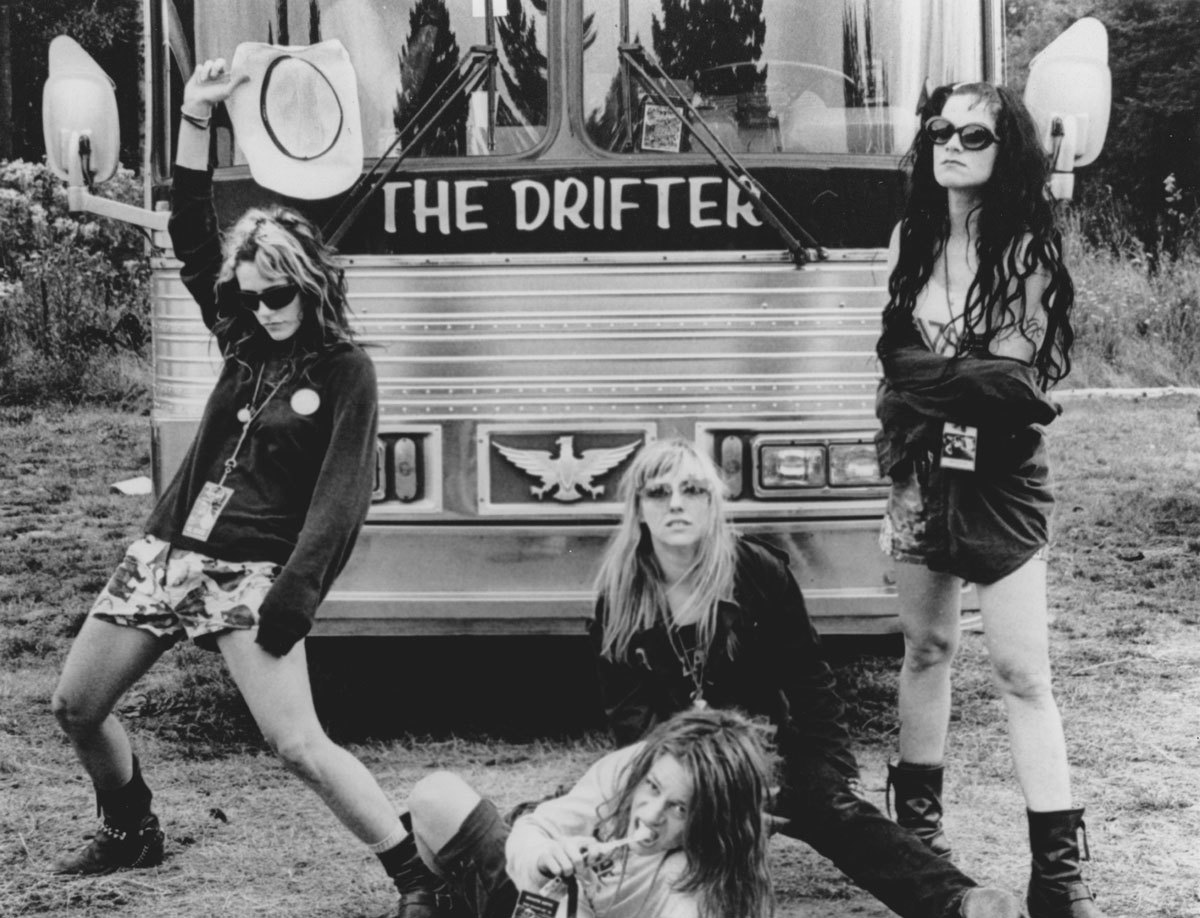It seems we’re becoming fascinated with the grunge and riot grrrl movements all over again and not merely for their face-shredding jams, but because the unrestrained sociopolitical commentary feels vital to our feminist times. Yet the story of L7, the all female hard rockers who paved the way for riot grrrls everywhere, has often been overlooked in our #tbts to the flannel era. Now, they’ve decided to change that.
Founding members Donita Sparks and Suzi Gardner joined forces back in 85, when LA’s music scenes were dominated by a boys club mentality that made rocking out as a woman nearly impossible. Five years later the group was signed to Sub Pop and suddenly, their no-holds-barred badassery was swept up in the grunge movement’s mainstream explosion. Singer Donita Sparks famously dropped her trousers and bared all during a live performance on The Word and hurled a bloody tampon into a surly Reading Festival crowd in 92 before getting Pearl Jam, Red Hot Chili Peppers, and Nirvana together for Rock for Choice.
The group has taken to Kickstarter to fund a new documentary, L7: Pretend We’re Dead, to tell their story from their playfully punk perspective (even the Kickstarter rewards are amazing: they’re offering a seance with the band at Hollywood’s Magic Castle). i-D caught up with Donita to talk about Pretend We’re Dead and how it’ll feel to stand in the same room as her bandmates for the first time in 18 years.

How did this documentary come about?
I’ve got a lot of photographs that were taken all during L7’s career, so I started digitizing them and organising them, which is when I also came across some of our old home movies. When I met filmmaker Sarah Price, she wanted to take a look at everything. When she saw all the footage, she said she’d never seen anything like it – the documentation we had done on our little video camera that we’d all chipped in for. She asked if she could try making a documentary, and I said, “Okay cool, I just don’t want it to be VH1 Behind the Music,” even though at times our story has Spinal Tap levels of cliche.
What were L7’s goals starting out?
Suzi and I had partnered up as writer/collaborators at the beginning of the band, back in 85. At that time, other musicians who were guys who played hard rock did not want to play with chicks. Our hand was sort of forced into looking for female musicians because it was a weird fucking time in Los Angeles. In the mid-80s, it was sort of a transitional period, there wasn’t one solidifying scene; there was a lot of new wave, cowpunk, and some hardcore punk still. Yet there was still this reluctance to play with women across the board. When we set out, we really just wanted to play clubs. Then, we wanted to headline clubs on a weeknight, then we wanted to play out of town. We never set out to conquer the world, or even really make an album. I don’t know what kept us going at first because it was very difficult.
How did things change for L7 between the 80s and riot grrrl’s rise to popularity in the 90s?
I think we helped to change it! We recorded our first single with Sub Pop in 89 and then the world really expanded for us. Instead of crowds looking at us with their jaws dropped like: “What’s going on on stage right now?” they saw us as women really rocking out. We were one of the most physical groups out there at the time and the audiences became chaotic. If you were standing at the back of the club watching this whole show unfold, it must have been really fucking entertaining. With Sub Pop, we had a new breath of fresh air and a scene to latch on to.
Why do you think there’s been such a resurgence of interest in riot grrrl and grunge lately?
For years I’ve had women come up to me saying that they were young in the 90s, they saw all these women on MTV, and they wish they’d been able to experience that more fully. This is where I kind of differ from some of the riot grrrl ideology, because I still think it’s so amazing and subversive that L7 hit the mainstream. I think it’s cool to get as much exposure as possible because there’s a 13-year-old kid in Bumfuck, Indiana watching MTV and you’re about to blow their mind, help them escape. Just like Bowie got on the Dinah Shore show, and John and Yoko went on the Dick Cavett show, I always thought that was the coolest fucking thing. To me as a young person, it was just like fucking crack. In the 90s, there were a lot of women who were pretty confrontational, just in their existence, and I think that has been a bit lacking today. I think that’s why there’s a hunger for these 90s bands.
Tell us more about L7’s reunion.
I hadn’t spoken to some of the band members in 14 years, and when I approached everyone, I said, “Hey, let’s not worry about making a record, do you want to do some shows?” so we’re not focusing on new material. But you never know, we haven’t had a rehearsal yet. It’s strange because this reunion seems to be happening in real time, the media and the public are getting the information as soon as the bandmates are. We haven’t even been in the same room in 18 years. That will happen in early March when we get together and rehearse. It’ll be weird, but in a good way.
Donate to the Kickstarted here
Credits
Text Emily Manning
Photography Charles Peterson and Mary Scanlon
